
Dhani Harrison: “I’ve got a clear vision of where I’m going in my life and in the place after…I want to get to the biscuits!”
The son of the Beatles guitarist takes a break from his many projects to finally release his debut solo album
Dhani is a British multi-instrumentalist musician, composer and singer-songwriter who is the only child of “the quiet Beatle”, George Harrison. Although choosing to follow his father’s musical footsteps later in life – after initially pursuing a career as a car designer – the 39-year-old has more than paid his dues in a career that includes three albums and two EPs with his band project thenewno2, along with a role in the supergroup Fistful Of Mercy, with Ben Harper and Joseph Arthur.
Working with Jeff Lynne, he co-produced his father’s posthumous 2004 album Brainwashed, which earned three Grammy nominations and won the award for Best Pop Instrumental Performance. He’s also collaborated with an eclectic array of musicians such as The Wu-Tang Clan, Regina Spektor, Pearl Jam, UNKLE and Prince, as well as becoming an accomplished soundtrack composer.
Now, after many years of playing in bands and writing for other people’s projects, Dhani felt right about creating a solo album and, as the resulting record IN///PARALLEL came out earlier this month, we called him for a chat…
You’re finally releasing your debut solo album after spending years as an active, prolific musician. Why now?
“I think it was just to do with giving myself a chance to develop as an artist. Obviously, growing up in my family, you don’t go and play little gigs and have the anonymity when you first start – not that anyone should feel sorry for me about that! Also moving into composing got me to the point where I was… Then there were a couple of projects that other bands had been working on big, major films and kind of dropped out, and I think it had an effect on the industry because people lacked confidence in the band scoring a film. So I was definitely wary of that and I wanted to not experience any of that negative backlash. Plus it’s more confusing for people and in the end it was supposed to be confusing! I don’t want to be confusing as a composer, I want to be able to reach my audience, reach my directive and reach the people.
“Then, getting to that point where it’s Paul Hicks and Dhani Harrison, then I did several TV shows and films, and I had been working on this record in-between all of these projects which meant it kept getting shelved. So they were sketches to me and I got to the point where I was going to take it to collaborate, but I kind of got further down the line than I thought I was. And when I took it to Paul to say, ‘Hey do you want to come and work on this with me?’ he was like, ‘This is great, I don’t want to do anything to this.’ So he started trying to mix some stuff with me and said, ‘Y’know what? This is a solo record. You should give this the release it deserves.’ And I said, ‘Woah woah, I’ve never done that before!’ But then I thought, if he thinks it’s good enough and I respect his judgment, then I should have the confidence and be myself.”
It’s said the album is about self-discovery and self-love. Was that planned before you started writing the album, or is that a theme you noticed at a later stage?
“It was kind of a journey. Y’know with some records you start in one place and then you end up in another place, but you haven’t gone that far? Well, this record – more than any other record I’ve ever done in my life – took me way further down in the process of being myself. It was a very busy couple of years, as it has been for the world, and I learned a lot about myself. 2015 and 2016 weren’t cakewalks of years in terms of the last few decades! The world’s changed so much, it’s like we’ve all been forced to change with it, or not get to where we need to go, and I’m really determined to get where I need to go. I’ve got a clear vision of where I’m going in my life and in the place after, whatever that life is called – I want to get to the biscuits!”
So you were trying to make sense of the madness through your songwriting?
“Yes it was cathartic. I think any good record starts with discovery, and any good story starts with discovering the character. If the character is me and I’m composing the story of my life then who am I? Where am I going? Where did I come from?”
Tell us more about how the album was made. Can you remember where you started?
“Because of composing, I really got a lot of new toys – equipment, soft synths, different programs and sequencers, pedals and all kinds of things – so I was tinkering around to lots of different soundtracks. Then I’d written a few little things and I’d shelved them. But I went through a big change and I started working on this film called Seattle Road, and the director Ryan David really let us go to town on it. It was one of the most fun things I’ve worked on, but all these bits of music were quite small keys.
“Paul tended to tackle some of the big orchestral stuff and in this film that’s where he gravitated to, and I gravitated to these dream sequence, trippy meltdown, trip-hop kind of things. A lot of the sounds I’d been farming that I’d never had a chance to use on scores, or stuff that other people had rejected but I was glad because I knew that was something I wanted for myself. So I was finally getting these things in order and I realised it was a whole album!
“We’d just mastered Seattle Road and made it into a double vinyl – it’s one of the best things I’ve ever done – and that was kind of the prelude to this record. I mastered them using the same technique with the same person in the same place, but years apart. So that’s how I, inadvertently, found the sound of the record – Seattle Road was my jump off point.”

Dhani: “If you concentrate your mind on anything hard enough in life, the wish becomes the will, and it will manifest”
When you went back to those little soundtrack bits, how did you approach developing them into songs?
“It’s funny because you’d think it was like trying to fit a square peg in a round hole, but it really wasn’t like that. They all existed in the cloud of your mind and I think it was just a question of changing myself so that I could raise my consciousness enough to hear them, rather than trying to change the song to fit words in it.
“I was talking to Annie Lennox about this a few days ago – we did a duet together in New York – and she was saying it’s like a sculpture, it’s already there inside the block and you’re just hewing away little bits. You may think the sculpture’s done and then you chop off a bit more and you refine it again. Eventually you reveal what’s there, but it’s like you have to reveal it in yourself first before it presents itself to you. If you concentrate your mind on anything hard enough in life, the wish becomes the will, and it will manifest. That’s the way the universe works. Them’s the rules!”
You’re well known for your work as a musician, but have there been collaborations where songwriting or co-writing has been at the heart of your involvement?
“Oh I don’t know where to… I mean, I’ve worked with people from Wu-Tang Clan all the way through to UNKLE. I just wrote some stuff with James Lavelle for the new UNKLE record, so there’s an album that hasn’t come out yet which has a couple of songs that I co-wrote with James, and Jack [Leonard] as well. Obviously there was Fistful Of Mercy, which was the collaboration I did with Ben Harper and Joseph Arthur, and there was some unfinished stuff that we started – a second record.
“We actually went in and completed a track with Jim Keltner on drums and it was called One True Love and that was something that never saw the light of day. I hope the Fistful Of Mercy will return again in some way, but we were all so busy. There are a couple of people I’ve become close with musically, who are amazing musicians and very famous, but I don’t want to say who there because I don’t want to ruin the vibration and the energy behind it.”
“But I wrote most of the stuff I’ve been on and I never had a problem being recognised in the projects that I’ve worked on.”
You’ve obviously got to know an array of legendary artists who probably influenced you, but are there any people that inspired you who might not be obvious to us?
“Obviously Ravi Shankar. And Anoushka Shankar, who I think doesn’t get enough credit in terms of being one of the most disciplined, naturally talented and well-practiced musicians on the face of the Earth. I’ve never actually worked with her, which is insane because we’re practically brother and sister! We’ve always talked about it, but it’s never been the right time. So she’s someone I love to work with and that would be very easy.
“I’ve always been a huge fan of the Bristol music scene – everything from Portishead to Massive Attack to Tricky, and everything from Geoff Barrow’s soundtracks to Martina Topley-Bird’s solo album. But I don’t think I’ve met any of them. I put people like them and Beth Gibbons on such a pedestal. Obviously there are huge musical figures like Jonny Greenwood and Thom Yorke, but I think it’s because all the Bristol people keep themselves to themselves – I never see them anywhere, until I go to their shows.”
Let’s talk about your film soundtrack work. Do you see that as strictly composing and production, requiring a different discipline, or is that still songwriting?
“It started with licensing songs to movies, then getting asked to do songs and end credits, but I really wanted to work on the deep, deep scores as well. So I came from a production background and it was just a missing piece of the puzzle – I don’t see it being any different. When you have a piece of music that makes you feel something… Like if you listen to Thomas Newman’s American Beauty theme, that’s one of the most beautiful songs, ever, but it’s not a song. It’s a tricky one.”
How do you approach writing a soundtrack?
“You’ve just got to jump right in. When you’re writing something and you’ve got a picture telling you what it’s doing, then that dictates where you’re going. But with my own record, it’s like an imaginary soundtrack to a film that hasn’t been made yet. You just draw on elements of your own life and I’m the central character of this film. How do I feel and how do I want someone to feel about my character?”

Dhani: “There’s a bunch of imaginary names for projects that I just want to make the T-shirts for…then we can say that it happened!”
Do you consciously think about it like that, or is it something you realise in retrospect?
“I think it’s a feeling really. It either feels like, ‘Oh yeah that’s me, I’ve got it,’ or you just go, ‘No,’ and chuck it away.”
Do you get offered film projects based on your style, or do you simple take your pick from all the different opportunities out there?
“I think it starts off with you getting a niche and your own style, then you build your portfolio. Like now I’ve got an electro band and a folk band, I’ve got a punk band… I’ve done all these things and I like to be diverse and collaborate with lots of people. The TV show I’m working on now is a hip-hop based soundtrack, so that draws on stuff that I worked on with Wu-Tang and earlier records when I had those guys guesting on my stuff. Like with a few films ago I did Learning To Drive and we had a crossover east-west soundtrack, so that was drawing on growing up, listening to Ravi Shankar and working with his students and having the tabla players coming in. It’s horses for courses.”
Are you starting to think about your next project or even your next album?
“Yeah I want to start a series of imaginary soundtracks – I’ve got a lot stuff stored up to do a sci-fi. I want to do another record with Mereki [Beach]. We’ve got a couple of different band ideas and she’s an incredible songwriter, but we didn’t get a chance to collaborate much. She came in late in the day and was more of a guest vocalist and had some great ideas, but this [record] was already fully formed, so I definitely want to do an album where we co-write it equally.
“The same with Jonathan Bates and Cami Grey, and Davide Rossi – all of the people I worked with – there’s a lot of unfinished business with the crew. We’ve all played in each other’s records, but this was the first time we could get the same crew on one record. So going back to the team, these fantastic lovely people that I work with, and getting a chance to do something fresh that’s not already in my mind.
“Paul Hicks and I also have a dance project, and we’ve talked about doing some really far-out drum ’n’ bass for decades. Obviously my career is a composer now and I’ve got to make money and be in the film industry and to progress, but I have all these side projects that I work on. Then there’s a bunch of imaginary names for projects that I just want to make the T-shirts for, and then we can say that it happened!”
No chance of you getting bored anytime soon then?
“Nope, never a dull moment around here!”
Can you recall any special moments when your father, Ringo and Paul were ever playing together?
“I remember during The Beatles Anthology in the early 90s, I was there when they did a lot of the filming. Actually one of the interview scenes was done at Portmeirion and that was what started my obsession with The Prisoner, which led to my band being called Thenewno2. So I definitely remember the last time they were ever in a room together, playing music – they were all jamming around, taking turns playing the kit, or the guitar, or singing.
“The scene is actually in the Anthology, but where they filmed that was in the old house that I lived in, which became Thenewno2 office, where we did all the artwork. So that room went on to have a lot of great work done in it, and it was actually the room that The Beatles last ever played live in! I don’t think they ever wrote anything in there, but we wrote a lot of stuff in that room.”



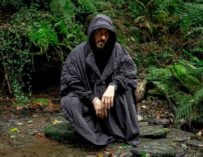
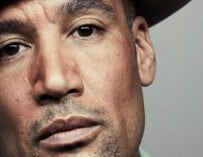
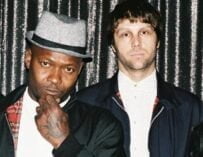


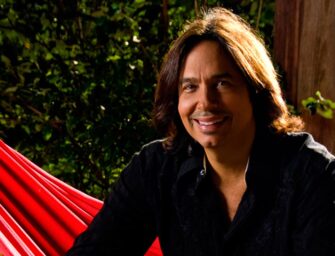
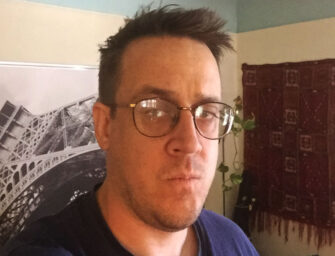

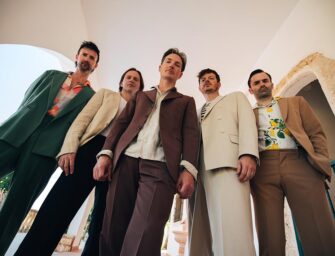























Amazing Album, and awesome live performances!